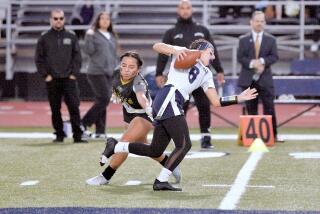Enrollment May Threaten Program for Highly Gifted
NORTH HOLLYWOOD — North Hollywood High School could be in danger of losing its nationally acclaimed magnet program for the highly gifted if the campus converts to a multitrack year-round calendar next year to accommodate surging enrollment, officials said Wednesday.
Although top officials vowed to keep one of the Los Angeles Unified School District’s “star” programs at North Hollywood High, they acknowledged that it would be at the expense of neighborhood families, some of whom moved within the school’s boundaries because of its overall strong reputation.
Officials emphasized that no one wants to disband the program for highly gifted students. But “there have been murmurings about whether to move [the program] to a less-impacted area,” said Caprice Young, the Los Angeles Board of Education member whose district includes North Hollywood High. “Certainly if enough kids are crammed into the school, the issue will be raised.”
Young, who moved within the school’s boundaries so her two children could eventually attend North Hollywood High, said she would fight to retain the magnet program at the campus.
“Next year, we’re going to have to face some tough choices,” she said, such as whether to relocate the magnet program or send neighborhood youth to other schools.
Board policy requires any high school busing out more than 250 students to adopt a year-round schedule.
The district will have more complete figures after it collects official enrollment estimates next month, but already North Hollywood High buses at least 300 students to nearby San Fernando Valley schools. Principal John Hyland estimated the number could be as high as 500 students, more than double last year’s figure.
Of the school’s estimated 3,525 students, 244 with minimum IQ scores of 145 travel from all over Los Angeles to attend the gifted magnet. Started in 1989, the program sends graduates to prestigious universities and, for the past three years, has produced the nation’s top Advanced Placement scholar.
“I love the program, and I would not be in favor of moving it,” said Hyland, who was unaware of any plans to relocate it. “If I have a role in making the tough choices, I would say moving the program would be detrimental to the school and unfair to all students.”
Hyland said students in the program work and interact with classmates in other specialized “academies” and programs in urban development, teaching, environmental sciences and public policy as well as with the zoo magnet. The latter is not in jeopardy because its 298 students spend most of the day studying at the Los Angeles Zoo, and therefore do not take up classroom space.
“The school is a tapestry,” Hyland said. “Removing the highly gifted magnet would be like plucking out a thread.”
In 1996, the Los Angeles Board of Education voted to place North Hollywood High on a year-round calendar, but the controversial decision was reversed after school officials found more classroom space.
Students and parents involved with the highly gifted program had argued that such a schedule would prevent students from participating in prestigious summer programs at Ivy League universities and could disrupt other activities such as Advanced Placement tests, for which students can receive college credit.
Gordon Wohlers, an assistant superintendent in charge of policy research and development, said the district’s open enrollment program, in which families choose to send children to other schools with vacancies, could relieve some of the crowding at North Hollywood High. “It has yet to be determined, but I don’t think the school would lose the magnet program,” he said.
School officials said other alternatives would be considered, but conceded that the issue could go before the Board of Education as early as December or January.
Hyland called one of the alternatives, adding more portable classrooms, impractical because the school is already using all available classroom space.
“We have a serious problem,” he said. “Children in the neighborhood are entitled to go to the school. [Overcrowding] is wrenching for a principal.”
Another possible alternative is keeping the school on a traditional calendar while busing out more neighborhood students. School officials agree that students who attend neighborhood schools generally perform better than students who spend several hours a week commuting.
Neighborhood parents who complain about their children being bused so an elite group of students can study at the campus have “a righteous beef,” Young said. “That’s why I’m manic about finding sites for new schools.”
Districtwide, officials need to build 100 schools in some of the city’s densest neighborhoods by 2008, when enrollment is expected to surge to 776,150 from the current 700,000. In North Hollywood, Young estimated that the area needs at least two high schools, one middle school and three elementary schools to relieve overcrowding.
The district risks losing state school bond funding for about half of the schools if officials fail to identify sites, purchase land and draw up architectural plans before the June 30 deadline.
Compounding the problem in the East Valley is the lack of vacant and uncontaminated land.
Several parents of highly gifted children said they plan to attend tonight’s 7 p.m. community meeting on overcrowding, which Young is hosting at Walter Reed Middle School in North Hollywood.
“Overcrowding is a real dilemma,” said Brian Hatkoff, whose 15-year-old son travels from Chatsworth to attend the highly gifted magnet. “If they relocate the program, wouldn’t they run into the same problem three or four years from now?”
More to Read
Sign up for Essential California
The most important California stories and recommendations in your inbox every morning.
You may occasionally receive promotional content from the Los Angeles Times.









